By end of the century, more than 90% of emperor penguin colonies are expected to be almost extinct due to the thinning of the seasonal sea ice in Antarctica as a result of global warming.

Up to 10,000 emperor penguin chicks have perished in Antarctica due to a catastrophic die-off. Because of the melting and disintegration of the sea ice beneath the chicks, they were unable to grow waterproof feathers. The birds most likely died from freezing or drowning.
In the west of the continent, near the Bellingshausen Sea, the incident took place in late 2022. Future risks, according to Dr. Peter Fretwell of the British Antarctic Survey, were to blame for the extinction.
By the end of the century, more than 90% of emperor penguin colonies are expected to be almost extinct due to the thinning of the seasonal sea ice in Antarctica as a result of global warming.
Emperors require sea ice as a solid platform for their mating cycle and to raise their young. These birds are in danger, he warned BBC News, if the ice is not as thick or breaks up more quickly than it should.
There is optimism since it is possible to lower the carbon emissions that are causing the warming. But if we don’t, we’ll bring these identifiable, magnificent birds dangerously close to being extinct.
The die-off is described by Dr. Fretwell and colleagues in the journal Communications Earth & Environment. In the Bellingshausen Sea region, the researchers monitored five colonies at Rothschild Island, Verdi Inlet, Smyley Island, Bryan Peninsula, and Pfrogner Point.
They were able to monitor the penguins’ behavior via the feces, or guano, they left on the white sea ice using the EU’s Sentinel-2 satellites.
As the Southern Hemisphere winter nears in March, adult birds leap onto the sea ice. Emperor rookeries, which normally take place in December or January, depend heavily on sea-ice platforms for breeding success.
The sea ice broke up in November, nevertheless, and hundreds of chicks fledged before they could swim. Only the most northern colony, Rothschild Island, showed any signs of breeding success, whereas the other four colonies all completely failed. For juvenile birds, this disturbance interferes with the processes of courting, copulation, egglaying, brooding, and eating.
Since 2016, the amount of sea ice that forms during the summer months in Antarctica has been rapidly declining, reaching new lows.
The Bellingshausen had essentially no ice cover in either of the two most recent summer seasons, 2021/22 and 2022/23, which were the two lowest years ever recorded.
Additionally, because floes have been forming slowly over the past few months, the colonies won’t likely start producing chicks for at least another year.
The winter’s maximum sea ice extent, which is typically attained in September, will track far below average.
Scientists predict that as the century progresses, the emperor’s range will be substantially more limited.
According to research by Dr. Fretwell and colleagues, the Arctic sea ice area has been declining for years, which will have an effect on almost a third of the more than 60 known emperor penguin colonies between 2018 and 2022.
In contrast, the sea ice in Antarctica seemed more resilient and modestly increased in size each year until 2016. The repercussions of this change in weather are being felt by the penguins.
Due to warm ocean water and a unique wind pattern, Antarctic sea-ice is decreasing. It is now difficult to spread since the Bellingshausen ice has forced it back toward the shore.
Dr. Caroline Holmes, a sea-ice specialist for Antarctica, explained that these extraordinary periods are to blame for the present collapse and noted that the quick transition was unexpected.
Studies in the Arctic have indicated that if we could find a way to stop global warming, the polar north’s sea ice would rebound. We don’t know if it would be true in the Antarctic. However, there is every reason to believe that the sea ice would rebuild if it were sufficiently cold.
Emperor penguin colonies are now listed as “Near Threatened” by the International Union for Conservation of Nature (IUCN), which compiles lists of the planet’s most vulnerable species.
Because of the threat that climate change poses to the emperors’ way of life, it has been suggested that they be moved up into the more urgent “Vulnerable” category.